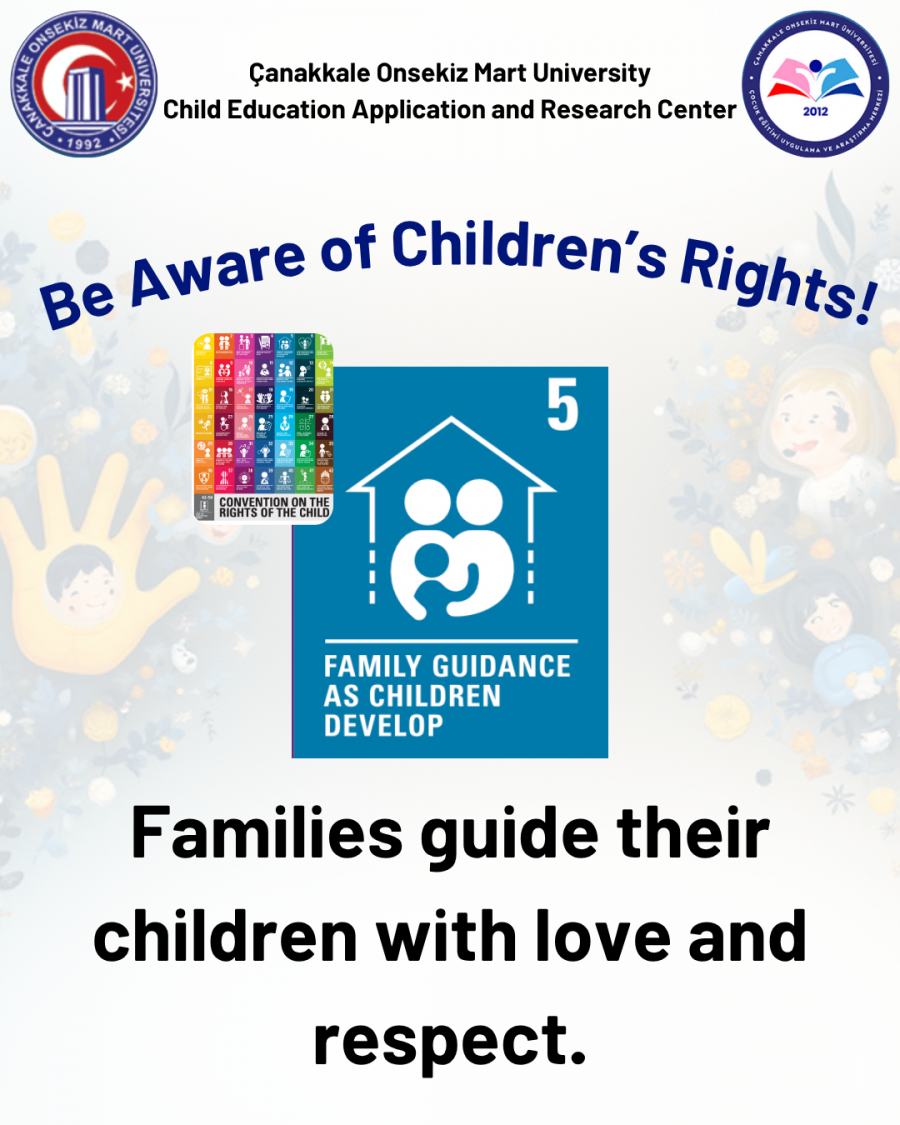


Article 5 of the United Nations Convention on the Rights of the Child recognizes the rights and responsibilities of parents, legal guardians, or others legally responsible for a child to provide appropriate direction and guidance in the exercise of the child’s rights. However, such guidance must be consistent with the child's evolving capacities. In other words, as children grow, mature, and develop the ability to make decisions, the role of adults should gradually shift from directing to supporting. This article redefines the relationship between the child, the family, and the state, seeing the child not merely as someone in need of protection, but as an individual who progressively learns to understand and exercise their own rights.
According to the Child Rights International Network (CRIN), Article 5 acknowledges that children, as they mature, gain competence to exercise their rights independently. When states establish age limits or implement policies regarding children’s participation in decision-making, they must consider each child’s individual development and context. This interpretation underscores that parents are not only authority figures but also guides who help children learn and practice their rights through shared understanding and respect.
Lansdown (2022) emphasizes that Article 5 safeguards the child’s right to guidance. Such guidance should be participatory, helping children build decision-making skills, form their own opinions, and take responsibility in a supportive environment. Varadan (2019) describes this as the principle of evolving capacities, clarifying that it is not merely tied to chronological age but to the child’s personal experiences and growth through learning and participation.
From a psychological perspective, Article 5 also provides an essential framework for understanding the quality of parenting. Soenens, Deci, and Vansteenkiste (2017) note that parenting that nurtures a child’s needs for autonomy, competence, and relatedness supports healthy psychological development. Overly controlling or authoritarian parenting can undermine a child’s confidence, while warm, respectful guidance fosters self-expression and resilience. Zhussipbek and Nagayeva (2023) frame this approach as democratic parenting —a balanced model grounded in love, boundaries, and respect —that strengthens children’s capacity to exercise their rights.
According to CRIN (2024), guidance is also profoundly connected to the child’s right to participation. Children, regardless of age, must be listened to, their opinions considered, and their views meaningfully incorporated into decision-making processes. This view challenges the traditional idea of parental or state authority as absolute. Guidance, in this sense, becomes a form of shared trust, communication, and mutual learning rather than a form of control.
Littlechild (2019) demonstrates that when parents and children work together in child protection processes, decisions made in the best interests of the child become more effective and sustainable. Similarly, Harnett (2007) reminds us that parenting is a learnable and adaptive process, one that evolves in tandem with the child’s growth.
In today’s world, Zakaria and Santiago (2023) observe that globalization, digitalization, and cultural diversity are transforming parenting practices. Parental authority is gradually shifting from hierarchical control to one that emphasizes dialogue, empathy, and cooperation. While parenting forms may differ across cultures, as CRIN (2024) emphasizes, respect for children’s rights remains a universal principle.
Ultimately, Article 5 envisions the family as a space of learning and development. Within the family, guidance is not about imposing direction but about opening a pathway for children to discover who they are, understand their choices, and assume responsibility for them. The role of parents is to accompany this journey, to guide with love, respect, and sensitivity as the child’s evolving capacities develop.
References
Child Rights International Network. (n.d.). Article 5: Parental Guidance and the Child’s Evolving Capacities. https://archive.crin.org/en/home/rights/convention/articles/article-5-parental-guidance-and-childs-evolving-capacities.html
Harnett, P. H. (2007). A procedure for assessing parents’ capacity for change in child protection cases. Children and Youth Services Review, 29(9), 1179–1188. https://doi.org/10.1016/j.childyouth.2007.04.005
Lansdown, G. (2022, January). Article 5: The right to parental guidance consistent with the evolving capacity of the child. In Monitoring State Compliance with the UN Convention on the Rights of the Child (p. 117).
Children in Social Work – Selected Problems of Social Work, 7.Littlechild, B. (2020). Empowering involvement in child-protection processes: Balancing the rights of parents and children in terms of having their voices heard.
Soenens, B., Deci, E. L., & Vansteenkiste, M. (in press). How parents contribute to children’s psychological health: The critical role of psychological need support. In L. Wehmeyer, T. D. Little, S. J. Lopez, K. A. Shogren, & R. Ryan (Eds.), Handbook on the Development of Self-Determination. New York: Springer.
Varadan, S. (2019). The Principle of Evolving Capacities under the UN Convention on the Rights of the Child. The International Journal of Children’s Rights, 27(2), 306–338. https://doi.org/10.1163/15718182-02702006
Zakaria, T., & Santiago, F. (2023). Current Study Concerning Parental Authority to Educate Children Reviewed Against the Provisions of the Child Protection Law in the Modern Era. Journal of Social Research, 3(1), 1–6. https://doi.org/10.55324/josr.v3i1.1638
Zhussipbek, G., & Nagayeva, Z. (2022). The need to bridge the gap between research on children’s rights and parenting styles: Authoritative/democratic style as an acultural model for the child’s well-being. Social Sciences, 12(1), 22. https://doi.org/10.3390/socsci12010022
Dr. Sezen ÇİÇEK APAYDIN
November 11, 2025